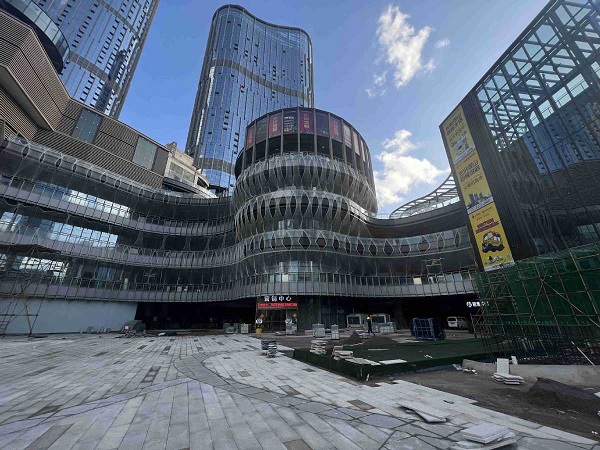Guiyang to house more luxury brands with new shopping mall
By ZHU WENQIAN in Beijing and YANG JUN in Guiyang| China Daily|Updated: April 20, 2022

The Lavant Shopping Center is pictured in Guiyang, Guizhou province. The high-end shopping mall is expected to open within this year. [Photo provided to China Daily]
Guiyang, capital of the mountainous Guizhou province in Southwest China, will launch its first high-end shopping mall with luxury brands this year, reflecting luxury brands' increasing investments in China since the start of the COVID-19 pandemic.
The mall, named Lavant Shopping Center, said nearly 90 international brands have decided to settle in, including Louis Vuitton, Gucci, Burberry, Balenciaga, Cartier, Salvatore Ferragamo and Bvlgari.
Guiyang Xingli Group serves as the parent of Lavant Shopping Center, and it owns six large-scale shopping malls in Guiyang. Currently, Lavant is under decoration, and top-end office buildings, hotels and lofts are located in the region, which gathers nearly 400,000 high-end consumers.
"The recent re-emergence of local cases of COVID-19 has had a certain impact on the process of the decoration and store openings. The China headquarters of most international brands are located in Shanghai, and the contagion may affect the opening of the shopping center," said Chen Chao, general manager of Xingli Group.
"Our target consumers are not limited to Guiyang, but the whole province. Due to the pandemic, the backflow of overseas spending has been distinctive, and the opening of Lavant Shopping Center has been following such trends. According to current projections, the shopping center is expected to achieve profits in three years," Chen said.
Lavant aims to attract more than 1 million customers monthly, and become a commercial complex that draws the highest volume of customer traffic in Guizhou, it said.
In Southwest China, Chengdu in Sichuan province has been a hot spot for luxury brands. Already having two high-end malls, the city is going to launch a third one in the latter half of this year. Besides targeting Beijing, Shanghai, Guangzhou and Shenzhen in Guangdong province, many luxury brands tend to hold marketing events in Chengdu.
"In recent years, the number of middle-income consumers in smaller cities has grown rapidly. With the consumption upgrade trend, consumers' spending capacity in third- and fourth-tier cities is gradually approaching major cities, and their demand for luxury products is accelerating," said Xie Yixuan, an analyst at LeadLeo Research Institute, a market research provider.
"High-end shopping centers are almost saturated in major cities, and many luxury brands choose to open new stores in smaller cities to seek additional growth. Lavant serves as a comprehensive commercial complex that combines high-end brand competitiveness and features ethnic elements. It is expected to become a cultural tourism business card for the city and even for the province," Xie said.
Despite mounting global social and economic challenges, China's luxury goods market saw an overall double-digit growth last year, with some brands seeing their revenue increase by more than 70 percent over the previous year. Chinese consumers have continued to shop mostly on the Chinese mainland, due to limited international travel options, a report by consultancy Bain& Co said.
"We anticipate this growth to continue, putting the country on track to become the world's largest luxury goods market by 2025, regardless of future international travel patterns," said Bruno Lannes, partner at Bain& Co.
Weiwei Xing, a partner at Bain &Co, said: "Overall, we expect Chinese consumers' personal luxury purchases to recover to pre-COVID-19 levels between the end of this year and the first half of 2023. This will be supported by continuous repatriation of spending and boosted by the gradual reopening of international travel, first in Asia and then globally."
By 2025, Louis Vuitton said it plans to open at least one store in every provincial capital city of China to further expand its presence in the country, according to the Moodie Davitt Report, which is published by Moodie International Ltd, a multimedia business-to-business publisher.






 play
play